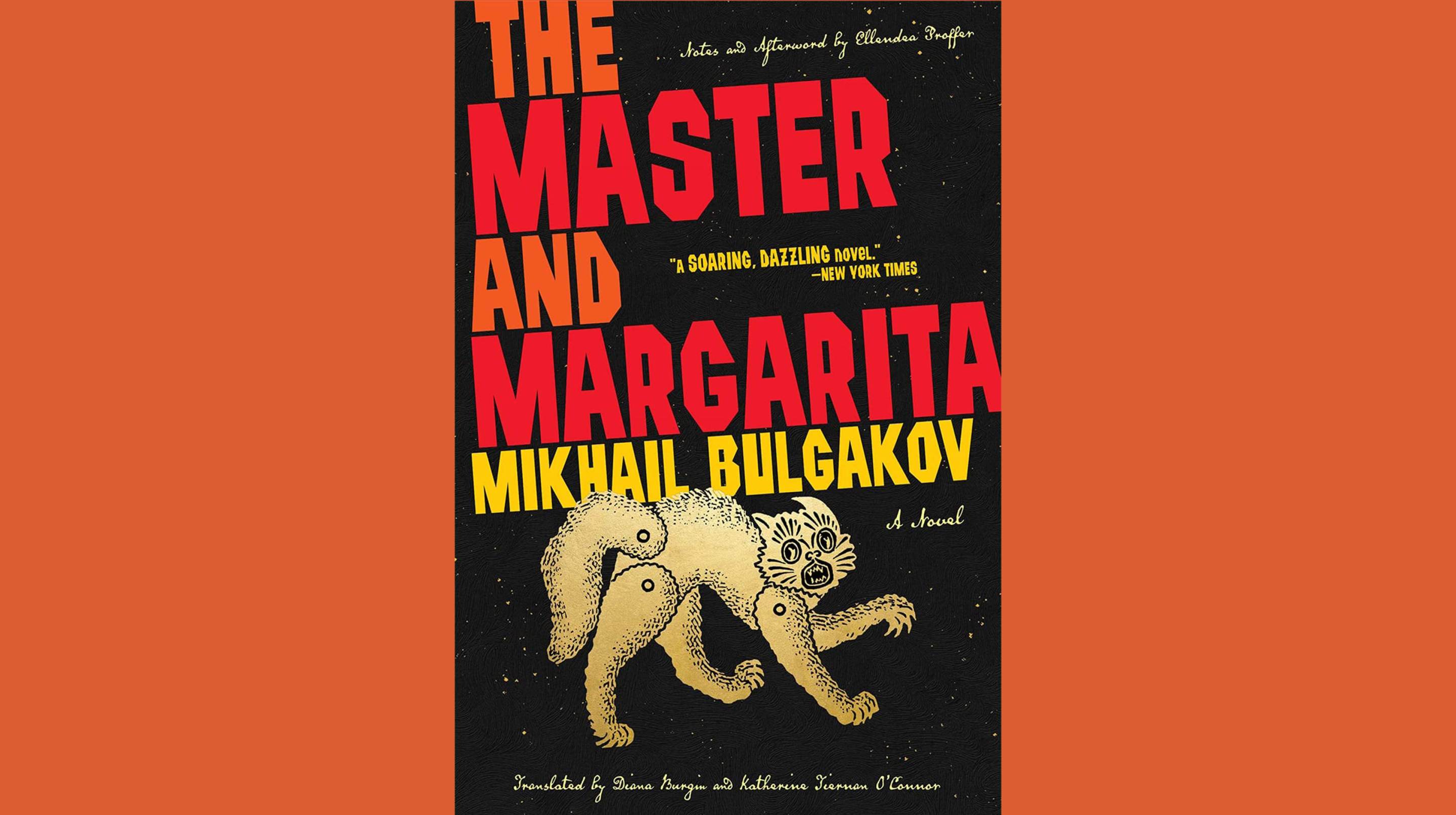Let’s Speak Of The Devil (And His Fat Cat) In ‘The Master And Margarita’
2:32 PM EST on January 11, 2023

Welcome back to Defector Reads A Book! Our December DRAB selection was Mikhail Bulgakov's The Master and Margarita, which the Defector book sickos have read and discussed. We’ll be down in the comments to chat with you as soon as you’re done reading.
Giri Nathan: Not to be rude to a whole country’s big and influential literary corpus, but I was shocked by how funny I found The Master and Margarita. We’re on a good streak of picking oldies that make me write “lol” in the margins.
Barry Petchesky: Oh Giri, you are missing out. Gogol is maybe the funniest writer ever. But we’re not here to talk about him. This book was a damn delight. I first read this in my early 20s, and in retrospect I did not get it at all, beyond the antics of Woland’s henchmen. Great physical comedy; I want to see a movie version of Behemoth’s shootout with the cops. But this time, everything clicked for me.
Maitreyi Anantharaman: I did keep thinking about how ripe for cinema it all was—the comedy, but also the atmosphere, and the different kooky sets. So many Moscow apartments. Apparently Baz Luhrmann wants to adapt it.
GN: He’d have a ball with the Ball, and the seance, and really the whole thing. There are so many moments where Bulgakov is effectively panning the camera, or zooming out to zoom in on some other antics in the city or even further flung. I was so entranced by the smoothness of his transitions: sometimes it’s that camera pan; sometimes someone starts dreaming; sometimes he casually spools off the complete future of some minor character; sometimes he riffs as the narrator. This was the most intoxicating quality of the novel to me—it could wander anywhere at any time and he had the technical chops to make it feel effortless.
BP: In my head I pictured this as a Studio Ghibli joint. Maybe it’s the big cat.
MA: Is Behemoth the best literary cat? He owns. Also the only other one I can think of is the Cheshire Cat.
GN: Only Hobbes is in the running for me. I guess talking cats have a big leg up.
BP: The humor in this book, especially the dark stuff, was expected: That’s sort of famously Russian novelists’ coping mechanism against, uh, being a Russian novelist. But I gotta ask: Did the emotional beats hit for you? Because satire is all well and good but unless there’s some universal truth or some heart underneath, it’s not enough.
GN: For a guy who made it into the title, I had almost no emotional investment in the nameless Master. "Lovesick historian hermit with beef about his rejected novel" didn’t really get me going. Margarita gets many more pages devoted to her inner life, though, and I cared about her. Homeless mostly disappears from the second half of the book, but he ends up being the only true witness to the whole thing, the only one who can hold it all in his head, and he gets a very poignant ending as well. He’s sort of the emotional bookends to the story. I did find myself worried about the fates of the random citizens who got swept up in the evil-doing, and I’d sigh relief when Bulgakov settled them into some traumatized but mostly unharmed ending, as he ties up loose ends in the epilogue. Outside of specific characters, Bulgakov makes you feel the ache and hope of a Russian populace under a capricious and cruel regime, trying to make sense of reality they’re not allowed to honestly describe, without losing their minds/lives. I think that’s the emotional register that satire can thrive in even when many of the characters themselves are more symbolic or technical devices.
MA: Considering the weirdness of the book—Bulgakov traverses like eight genres—I was surprised by how well the pretty conventional love story worked for me. It’s very sweet! Their work together on the novel feeds their romance, and then that energy is channeled back into the novel. And I did like the chapter where the Master tells his story to Ivan—in my translation it was called “The Hero Enters,” ha ha—and the ominous way he describes the suddenness of his love for Margarita. “Love leaped out in front of us like a murderer in an alley leaping out of nowhere, and struck us both at once. As lightning strikes, as a Finnish knife strikes!”
BP: Margarita, for all that she’s pretty close to a Manic Pixie Dream Girl, definitely worked for me; really the only character who gets an inner life at all. The Master is just a plot device and a stand-in for the author in that he’s the only writer out here doing true, brave art and not dumbing it down just to be successful or published. (Also, apparently Bulgakov was a big-time Wife Guy, so that makes this proxy romance pretty sweet.) I have to say, it’s a pretty big swing to write a satire that more or less calls all of Bulgakov’s contemporaries a bunch of cowardly Pontius Pilates. How confident do you two feel that you’d be brave enough to publish true, brave blogs under an oppressive and censorious bureaucracy? And was Bulgakov even as brave as the Master, considering he didn’t publish this book in his lifetime?
GN: I was reading about how Bulgakov, though iced out of some literary circles, had a direct line of communication with Stalin, who liked his plays. And he’d be presented these opportunities to go travel—like the writers in the novel queued up at Massolit—only to have them snatched away. He burned an early draft of this novel out of caution and rewrote it from memory. It’s not surprising that he thought that deeply about cowardice because he was constantly calibrating what he could or couldn’t say. He was always unsure of where exactly he stood, how precarious his position was, whether he’d be praised by the guy in charge or just thrown in jail.
BP: So it’s like working for Nick Denton? I’ll be here all night folks, don’t forget to tip your demon, and try the caviar. The story behind the publication of this book is so thrilling to me. Can you imagine the news comes out that there’s an unseen but completed manuscript by one of the literary greats, decades after their death? And it turns out to be their magnum opus? I know things had changed in the U.S.S.R. by that time, but even just reading Master and Margarita must have felt like an important and radical act. I think Bulgakov would have appreciated that, too: He clearly sees art as a radical act. Good art, anyway. I laughed when the Master asks Homeless if his poetry was good, and he replies, “Atrocious!”
GN: A burn so bad it made him stop writing poems altogether. OK, maybe that and some other stuff. But while we’re in the business of evaluating the output of fictional writers, what do we think of the Master’s novel? It’s threaded into this book in such clever ways. First as Woland’s monologue, then as Ivan’s sedated dream, then as Margarita reading the actual pages. I confess I was initially dreading the idea of having to read about Pontius Pilate’s inner struggles for long stretches of this book, but it gets so juicy as it develops. When he orders the hit on Judas (in double-speak), we get a great little set piece.
MA: There’s also a kind of twin ending, right? The last words of the novel match what we know are the last words of the novel within the novel.
GN: Yeah, and they’re also the last words of the epilogue, too. Which raises fun meta questions: Is The Master and Margarita the Master’s own novel? We have Bulgakov writing a novelist who is writing Bulgakov’s novel. Or maybe the epilogue is its own onion layer and that’s Bulgakov returning to the pen?
BP: Whoa. I think the recursive nature of things really hammers home the idea that there’s nothing new under the sun when it comes to humans; cowardice and venality existed and were punished 2,000 years ago in Jerusalem, and they exist and will be punished in Moscow. That’s why Woland’s here, right? They toss off a line during their show about wanting to see how the citizens have changed, if at all. I think they found the answer was mostly no (“The city folk have changed greatly … externally, that is”) except for the Master and Margarita—whose goodness was enough to redeem Pilate from his purgatory. Just the fact that the repeated last words are about Pilate is interesting to me.
MA: I would like to chat about Woland a little more and his nature. The audience at the Variety craves “exposure,” and that’s exactly what they get. Their greed and vanity is exposed.
GN: I kept thinking about how he chose to dole out his mercy, and how it reflects his “values,” to the extent those can be described. He kills Berlioz, who was in the middle of an argument against the existence of God (which doubles as an argument against him, so no wonder he took it personally). He kills the Baron, who was trying to spy on him. Everyone else makes it out alive, if humiliated or traumatized. He hates when people ask him for favors but is happy to use his omnipotence so long as he’s the one offering. The devil and Jesus both agree that the Master’s novel is great enough to earn him a lifetime of “peace,” if not “light.” You’d think the Devil might be more wantonly evil, and his henchmen do a lot of hijinks for sure, but at the end of the day wasn’t it kind of a restrained performance from Woland?
BP: Isn’t Woland personally unable to bestow mercy? That’s why Margarita has to be the one to free Pilate, and to remove Frieda’s handkerchief, and why Woland doesn’t count that as her one wish for him to grant. Although, mercy, as he says, “sometimes creeps, quite unexpectedly and perfidiously, through the narrowest cracks.” But I agree that this version of Satan is not particularly evil. He’s at times ... likable? Abaddon is the one who brings death, impersonally.
MA: It’s in the epigraph: He is “part of that power which eternally wills evil and eternally works good.” He wreaks havoc, but there’s a certain moral logic to the way he works.
BP: I really need to read both Faust and Paradise Lost.
GN: Milton’s devil is another charmer. But that’s a good point—mercy is not his to bestow. It’s Margarita's in the handkerchief case, and in other cases it’s just that he has some discretion over whether to destroy them or not. Kind of the negative space of mercy. His way of granting peace to the Master and Margarita is, in literal terms, killing them. And he almost never gets his hands dirty himself, relying instead on his minions. Early in the novel I read Woland as a volatile and unpredictable evil, but his evil might wind up a more stable and coherent backdrop to the kind that Bulgakov is critiquing in his own world.
BP: Lawful evil, if you’re a nerd. He is somewhat lawyerly, actually: There are clear rules and clear violations of them and clear punishments for it. But when it comes to mercy and rewards, what about the Master and Margarita’s ultimate fate: to live in a cabin in the woods in quiet forever, and not, as apparently was on the table, to go to heaven. “He does not deserve the light, he deserves peace,” as Matthew Levi, another onetime coward who received forgiveness, says. But what’s the difference? My read on that was that the Master had already found the light, or ultimate truth, via his work. But peace was what had been denied him. And so they sort of take Pilate’s place in limbo, but they are together, and they have love, so it’s a pretty good deal.
MA: Yeah, maybe peace is equally desirable to a writer. Remember, earlier, he cries, “And at night, by moonlight, I have no peace … Why am I being troubled?”
GN: There’s a pretty straightforward sense in which the peace they’re offered is a quality-of-life upgrade on the basement life they’d hoped to secure for themselves. Which makes me think of a funny minor theme in the novel—the unliveability of Moscow. People are crammed into tiny apartments with roommates and primus stoves. Writers are clamoring for country retreats. There’s an “apartment slicker” trying to flip six bedrooms across the city into one five-bedroom house. There are all these extended descriptions of people entering or exiting the city, bemoaning its piled-up ugliness or praising the color of the sun reflected in the windows.
MA: There’s even a guy basically doing the thing where you scan the obituary section for an apartment! Like the joke from When Harry Met Sally.
BP: Giri, you say unlivable, I say alive. The Moscow of this book is this huge, chaotic, breathing, seething thing—heads rolling, underwear-clad women dashing about, foreign money appearing everywhere. I’d much rather be there than sleepy old Yalta, even if I could get there in an eyeblink. Moscow (today, obviously, not under Stalin) is definitely on my bucket list. A friend who went told me there’s a Bulgakov Museum (actually two competing ones in the same building) and on the premises lives a large black cat, and if you ask the staff about him they pretend they have no idea how he got there. Great bit.
GN: That rules. If we’re talking places I’d want to be in Moscow, take me to the restaurant at Griboedov’s (pre-arson, ideally). For a novel that dwells so often in the metaphysical we gotta give Bulgakov credit for his concrete descriptions—especially food!!! Though I had to look up some terms I confirm that I’m up for “sterlet slices interlaid with crayfish tails and fresh caviar … eggs en cocotte with mushroom purée in little dishes.” When he rattled off the menu at the restaurant, and the low prices, I was drooling like Dave McKenna when he hears about a 7-Eleven espresso promotion.
MA: I would very much like to cut a slice of pineapple and salt and pepper it.
GN: Salt and pepper (chili powder in my case) is very underrated on fruit.
BP: The devil knows how to live well. Or at least cats do.
GN: The pineapple also becomes a metaphor in Behemoth and Koroviev’s chat about the writers’ house: They love how this place cultivates talent like a hothouse does pineapples. I thought that was very cute even though they do burn it down like 10 minutes later.
MA: Koroviev, by the way, was my favorite of the retinue. His feigned hysteria in the scene with Maximilian Andreevich was killing me: “Run clean over! I was a witness. Believe me—bang! And the head’s gone! Crunch—there goes the right leg! Crunch—there goes the left leg! That’s what these trams have brought us to!” And then later, after sobbing against a wall for a few minutes, he says again, “That’s trams for you!”
GN: Anytime he or Behemoth were feigning distress before doing big magic was also very funny to me. My overall favorite line belongs to the cat, dictating his certificate for Margarita’s unfortunate neighbor used by Natasha as a witch’s broom substitute: "It is hereby certified that the bearer, Nikolai Ivanovich, spent the said night at Satan’s ball, having been summoned there in the capacity of a means of transportation… make a parenthesis, Hella, in the parenthesis put 'hog.' Signed — Behemoth.” Yeah, in the parentheses, put “hog.” I died. Did HamNo write this certificate?
BP: I was surprisingly moved when Koroviev and Behemoth were freed from Woland’s service at the end. Those scamps deserve the peace and the light.
DRAB will be in the comments for the next couple of days to hear your thoughts and chat with you. If you missed out on this book, don’t worry! We’ll announce our next pick soon.
If you liked this blog, please share it! Your referrals help Defector reach new readers, and those new readers always get a few free blogs before encountering our paywall.
Staff Writer
Staff Writer
Deputy Editor
Read More:
Stay in touch
Sign up for our free newsletter




